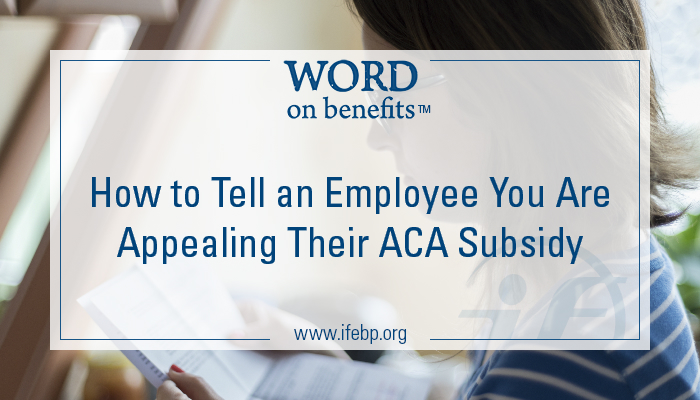How to Tell an Employee You are Appealing Their ACA Subsidy
Soon the U.S. Department of Health and Human Services (HHS) will begin notifying employers about employees receiving advance premium tax credits (APTC) or subsidies for 2016 on the ACA federally facilitated exchange. For an idea of what the notice will look like, see the sample employer notice recently posted by HHS. In his May 10, 2016 post for HNi, Mark Brault explains why employers might receive the notice.
If you receive a notice despite providing ACA-compliant health coverage, you have two steps to take promptly: 1. Appeal to HHS. 2. Notify employee. Here are a few guidelines and a communication template for reaching out to your employee.

How and why to appeal to HHS
Employers may want to appeal to HHS the finding that an employee was not offered employer health coverage that was affordable and of minimum value. In a May 23, 2016 post for Holland & Knight, Nicole Elliott and Christopher Buch explain why.
Employers have 90 days after receiving an HHS notice to appeal. HHS posted an appeal form on HealthCare.gov for appealing to the federally-facilitated exchange as well state-based exchanges in California, Colorado, District of Columbia, Kentucky, Maryland, Massachusetts, New York and Vermont. The other state-based exchanges have their own notice and appeal procedures.
HHS notifies employee of appeal
If you appeal, HHS will notify your employee. If you are appealing because you believe you offered coverage that was affordable and of minimum value, how should you communicate this to your employee? It’s tricky, because if your appeal is successful, your employee may need to repay the IRS for subsidies already received.
You should consult your attorney to review employee communications, but here’s something to get you started
Dear employee,The Affordable Care Act exchange where you purchased health insurance for 2016 notified us they granted you a government-paid advance premium tax credit to help pay for the insurance. Usually, a person receives these credits only if his or her employer did not offer him or her affordable health insurance coverage of a minimum value.
We are committed to providing competitive wages and benefits, including health insurance, to full-time employees. We regularly review our health insurance program in order to provide valuable coverage at a cost that is as reasonable as possible. We believe the health insurance we offered you for 2016 meets the Affordable Care Act guidelines for being affordable and providing minimum value.
We are appealing the notice from the Affordable Care Act exchange because if the government believes we did not offer our full-time employees health coverage that met or exceeded the Affordable Care Act requirements for affordability and value, the Internal Revenue Service (IRS) could charge us large fines. We believe the health insurance we offer our full-time employees meets the government requirements.
We wanted to let you know we are appealing. The government will also notify you and, depending on its final decision, you might have to make a repayment to the IRS for an advance premium tax credit if they find you were not eligible. We want to assure you we are not accusing you of any wrongdoing and this does not affect your employment relationship with us in any way. We value all our employees, and we realize the Affordable Care Act is a very complicated law for both employers and employees.
If you have questions on how the premium tax credits and cost-sharing subsidies are credited or repaid, please see questions 20 through 25 on the IRS Questions and Answers on the Premium Tax Credit webpage. You can also visit HealthCare.gov’s premium tax credit page or questions and answers section.
If you have any questions about the health insurance we offer here at _________, please contact an employee benefits team member at _______ or visit our company website at __________.
Sincerely,
Your company name here
HHS notices are different from IRS notices
Note: This blog post deals with HHS notices, not Internal Revenue Service (IRS) notices. The IRS, not HHS, is responsible for assessing and collecting shared responsibility payments from employers and will begin notifying employers later in 2016 if they face possible shared responsibility penalties for 2015. At that time, employers can respond and appeal directly to the IRS before it assesses an ACA shared responsibility penalty. Appealing to HHS is not the same thing as appealing to the IRS.
Developed by International Foundation of Employee Benefit Plans staff. This does not constitute legal advice. Consult your plan professionals for legal advice.
Lois Gleason, CEBS
Manager, Reference/Research Services at the International Foundation
